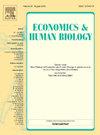Hot and cold, safe and unsafe: Evaluating the impact of extreme temperatures on work-related accidents in China
IF 1.8
3区 医学
Q2 ECONOMICS
引用次数: 0
Abstract
We investigate how extreme temperatures impact work-related accidents across 411 cities in China from 2015 to 2019. Using a linear probability model, we find a significant causal link between rising temperatures and workplace accidents, with a 10°C increase leading to a 0.09 % rise in accident probability. Our analysis shows that temperatures over 24–26°C markedly increase accident risk, particularly in outdoor-intensive industries like construction and public facility management, with southern regions facing higher hazards due to prolonged heat exposure. Robustness checks, including lagged and lead temperature effects, confirm the consistency of our findings, reinforcing the direct link between environmental conditions and accident occurrence. This research contributes a comprehensive, causal view of temperature’s effect on workplace safety in a developing context, emphasizing the urgent need for temperature-sensitive safety protocols. For developing countries such as China, climate-resilient labor policies, including adaptive work schedules, cooling breaks, and shaded workspaces, are critical to protect workers and sustain productivity as global temperatures rise. Our findings lay a foundation for policy actions aimed at bolstering occupational safety standards to address escalating climate risks.
热与冷,安全与不安全:评估极端温度对中国工伤事故的影响。
我们调查了2015年至2019年中国411个城市极端气温对工伤事故的影响。使用线性概率模型,我们发现温度升高与工作场所事故之间存在显著的因果关系,温度升高10°C导致事故概率上升0.09 %。我们的分析表明,温度超过24-26°C会显著增加事故风险,特别是在建筑和公共设施管理等户外密集型行业,南方地区由于长时间暴露在高温下而面临更高的危险。稳健性检查,包括滞后和铅温度效应,证实了我们的发现的一致性,加强了环境条件和事故发生之间的直接联系。本研究对发展中环境下温度对工作场所安全的影响提供了一个全面的、因果关系的观点,强调了对温度敏感的安全协议的迫切需要。对于中国等发展中国家来说,适应气候变化的劳动政策,包括适应性工作时间表、休息时间和阴凉的工作空间,对于在全球气温上升的情况下保护工人和维持生产力至关重要。我们的研究结果为旨在提高职业安全标准以应对不断升级的气候风险的政策行动奠定了基础。
本文章由计算机程序翻译,如有差异,请以英文原文为准。
求助全文
约1分钟内获得全文
求助全文
来源期刊

Economics & Human Biology
医学-公共卫生、环境卫生与职业卫生
CiteScore
4.50
自引率
12.00%
发文量
85
审稿时长
61 days
期刊介绍:
Economics and Human Biology is devoted to the exploration of the effect of socio-economic processes on human beings as biological organisms. Research covered in this (quarterly) interdisciplinary journal is not bound by temporal or geographic limitations.
 求助内容:
求助内容: 应助结果提醒方式:
应助结果提醒方式:


